People
Learn more about the people who make up CABES.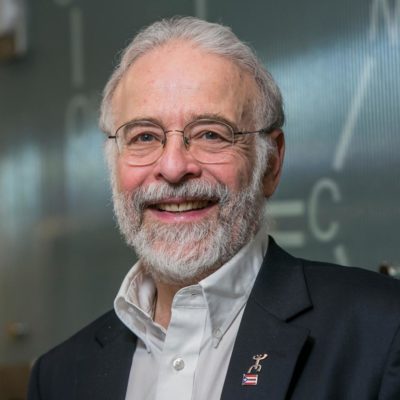
Héctor Abruña
Center Director / Researcher: Electrocatalysis, Supports, Methods
Professor Abruña, Emile M. Chamot Professor of Chemistry, completed his graduate studies with Royce W. Murray and Thomas J. Meyer at the University of North Carolina at Chapel Hill and was a postdoctoral research associate with Allen J. Bard at the University of Texas at Austin. After a brief stay at the University of Puerto Rico, he came to Cornell in 1983. Professor Abruña was the director of a previous EFRC, the Energy Materials Center at Cornell (emc2). His research group focuses on the study of electrochemical phenomena of new materials, using a wide variety of techniques, with emphasis on applications such as fuel cells, batteries, and molecular assemblies for molecular electronics. He is an AAAS Fellow and recipient of numerous awards, including an Alfred P. Sloan Foundation Research Fellowship, a John S. Guggenheim Fellowship, a J. W. Fulbright Senior Research Fellowship, the Faraday Medal of the Royal Society, and the Conway Prize . He was elected to the American Academy of Arts and Sciences in 2007 and to the National Academy of Sciences in 2018. He was recently awarded the Allen J. Bard Medal for 2019, one of the highest honors of the Electrochemical Society.
Professor Abruña, Emile M. Chamot Professor of Chemistry, completed his graduate studies with Royce W. Murray and Thomas J. Meyer at the University of North Carolina at Chapel Hill and was a postdoctoral research associate with Allen J. Bard at the University of Texas at Austin. After a brief stay at the University of Puerto Rico, he came to Cornell in 1983. Professor Abruña was the director of a previous EFRC, the Energy Materials Center at Cornell (emc2). His research group focuses on the study of electrochemical phenomena of new materials, using a wide variety of techniques, with emphasis on applications such as fuel cells, batteries, and molecular assemblies for molecular electronics. He is an AAAS Fellow and recipient of numerous awards, including an Alfred P. Sloan Foundation Research Fellowship, a John S. Guggenheim Fellowship, a J. W. Fulbright Senior Research Fellowship, the Faraday Medal of the Royal Society, and the Conway Prize . He was elected to the American Academy of Arts and Sciences in 2007 and to the National Academy of Sciences in 2018. He was recently awarded the Allen J. Bard Medal for 2019, one of the highest honors of the Electrochemical Society.
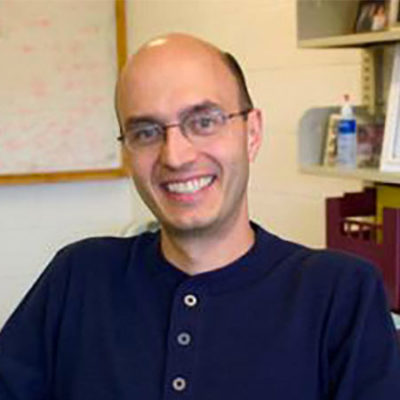
Tomás Arias
Thrust Leader: Theory
Linking the ab initio quantum mechanical description of materials to the physical behavior of real materials, involving identification of problems where the quantum perspective can make a significant impact, exploitation of theoretical techniques and supercomputer architectures to carry out large scale quantum calculations, and development of new theoretical techniques to link ab initio calculations with phenomena on larger scales. Current application areas include mechanical properties of nanoscale systems including carbon nanotubes, fundamental processes involved in crystal growth, quantum mechanics of systems in contact with a solution, physics of novel solar cell systems
Linking the ab initio quantum mechanical description of materials to the physical behavior of real materials, involving identification of problems where the quantum perspective can make a significant impact, exploitation of theoretical techniques and supercomputer architectures to carry out large scale quantum calculations, and development of new theoretical techniques to link ab initio calculations with phenomena on larger scales. Current application areas include mechanical properties of nanoscale systems including carbon nanotubes, fundamental processes involved in crystal growth, quantum mechanics of systems in contact with a solution, physics of novel solar cell systems
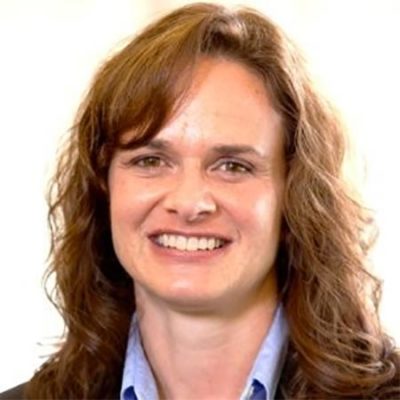
Kathy Ayers
Advisory Board Member
Dr. Katherine Ayers joined Proton OnSite in 2007 and is currently Vice President of Research and Development. Her technical expertise spans multiple electrochemical devices including batteries, fuel cells/electrolyzers, and solar cells. She has responsibility for Proton’s R&D strategy in membrane-based electrochemical devices, and maintaining and executing Proton’s multi-year technology roadmap. She is currently a member of the Scientific Advisory Board at the Joint Center for Artificial Photosynthesis (JCAP), established in 2010 as a U.S. Department of Energy Energy Innovation Hub with lead member institutions Caltech and Lawrence Berkeley National Laboratory. Prior to joining Proton, Dr. Ayers spent 10 years at Energizer Battery Company, with responsibility for strategic materials direction, diagnosis of polarization losses and low battery service, and fundamental insight on other production issues. She received her B.S. degree in Chemistry/Chemical Physics at U.C. San Diego and was awarded the prestigious Barry M. Goldwater Scholarship in 1991. She also received the Urey Award as the top chemistry graduate in 1993. She attended Caltech on an NSF Graduate Fellowship (1993-1996) and earned her Ph.D. in chemistry under the direction of Professor Nathan Lewis in 1997.
Dr. Katherine Ayers joined Proton OnSite in 2007 and is currently Vice President of Research and Development. Her technical expertise spans multiple electrochemical devices including batteries, fuel cells/electrolyzers, and solar cells. She has responsibility for Proton’s R&D strategy in membrane-based electrochemical devices, and maintaining and executing Proton’s multi-year technology roadmap. She is currently a member of the Scientific Advisory Board at the Joint Center for Artificial Photosynthesis (JCAP), established in 2010 as a U.S. Department of Energy Energy Innovation Hub with lead member institutions Caltech and Lawrence Berkeley National Laboratory. Prior to joining Proton, Dr. Ayers spent 10 years at Energizer Battery Company, with responsibility for strategic materials direction, diagnosis of polarization losses and low battery service, and fundamental insight on other production issues. She received her B.S. degree in Chemistry/Chemical Physics at U.C. San Diego and was awarded the prestigious Barry M. Goldwater Scholarship in 1991. She also received the Urey Award as the top chemistry graduate in 1993. She attended Caltech on an NSF Graduate Fellowship (1993-1996) and earned her Ph.D. in chemistry under the direction of Professor Nathan Lewis in 1997.
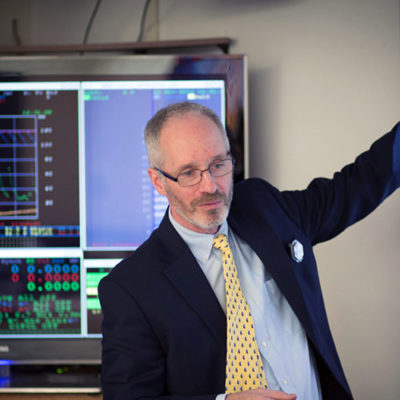
Joel Brock
Researcher: Methods
After receiving his doctoral degree, Brock spent two years as a postdoctoral research associate at the Massachusetts Institute of Technology and then joined the Cornell faculty in 1989. He served as Director of the School of Applied & Engineering Physics from 2000-2007. At Cornell, he is affiliated with the Cornell Center for Materials Research (CCMR), the Energy Materials Center at Cornell (emc2), and is Director of the Cornell High Energy Synchrotron Source (CHESS). He is a member of the American Crystallography Association, the Materials Research Society, the American Association for the Advancement of Science, the American Society of Engineering Education, Sigma Xi, the Union of Concerned Scientists, and The Materials Society. Brock is a fellow of the American Physical Society.
After receiving his doctoral degree, Brock spent two years as a postdoctoral research associate at the Massachusetts Institute of Technology and then joined the Cornell faculty in 1989. He served as Director of the School of Applied & Engineering Physics from 2000-2007. At Cornell, he is affiliated with the Cornell Center for Materials Research (CCMR), the Energy Materials Center at Cornell (emc2), and is Director of the Cornell High Energy Synchrotron Source (CHESS). He is a member of the American Crystallography Association, the Materials Research Society, the American Association for the Advancement of Science, the American Society of Engineering Education, Sigma Xi, the Union of Concerned Scientists, and The Materials Society. Brock is a fellow of the American Physical Society.
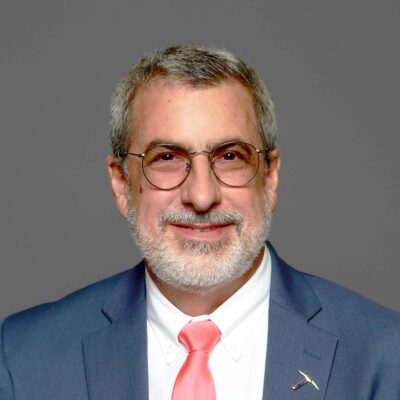
Carlos Cabrera
Researcher: Electrocatalysis
From January 2, 1989 to June 30, 2021, Dr. Carlos R. Cabrera was Professor of Chemistry and Researcher at the University of Puerto Rico, Río Piedras Campus. Currently, he is Professor and Chair at the Department of Chemistry and Biochemistry at the University of Texas at El Paso. His research group is currently developing the following research areas: Alkaline Fuel Cell Catalysts Development, Microbial-Electrochemical Urine Purification, and Cancer Biosensors. Recently, his catalyst Fuel Cell work has focus on the ammonia oxidation reaction (AOR) and oxygen reduction reaction (ORR) in alkaline media. His group has done AOR studies under microgravity conditions and at the International Space Station, funded by NASA, for Space Applications. Currently, his group has two Postdoctoral Fellows (Dr. Yermary Morales- Lozada and Dr. Subhajit Bhunia), six Graduate and four Undergraduate Students. Through his academic career, he has graduated-mentored 43 Ph.D.s, most of them females and Hispanics US Citizens. He has over 200 peer-reviewed publications, two patents, seven book chapters, and edited a book titled “Advanced Nanomaterials for Aerospace Applications”. This later book was an outcome of more than 10 years of research collaboration with NASA Centers through a NASA-MIRO Center for Advanced Nanoscale Materials in which he was the Project Director. His research is currently funded by DOE, NSF, and NASA.
From January 2, 1989 to June 30, 2021, Dr. Carlos R. Cabrera was Professor of Chemistry and Researcher at the University of Puerto Rico, Río Piedras Campus. Currently, he is Professor and Chair at the Department of Chemistry and Biochemistry at the University of Texas at El Paso. His research group is currently developing the following research areas: Alkaline Fuel Cell Catalysts Development, Microbial-Electrochemical Urine Purification, and Cancer Biosensors. Recently, his catalyst Fuel Cell work has focus on the ammonia oxidation reaction (AOR) and oxygen reduction reaction (ORR) in alkaline media. His group has done AOR studies under microgravity conditions and at the International Space Station, funded by NASA, for Space Applications. Currently, his group has two Postdoctoral Fellows (Dr. Yermary Morales- Lozada and Dr. Subhajit Bhunia), six Graduate and four Undergraduate Students. Through his academic career, he has graduated-mentored 43 Ph.D.s, most of them females and Hispanics US Citizens. He has over 200 peer-reviewed publications, two patents, seven book chapters, and edited a book titled “Advanced Nanomaterials for Aerospace Applications”. This later book was an outcome of more than 10 years of research collaboration with NASA Centers through a NASA-MIRO Center for Advanced Nanoscale Materials in which he was the Project Director. His research is currently funded by DOE, NSF, and NASA.
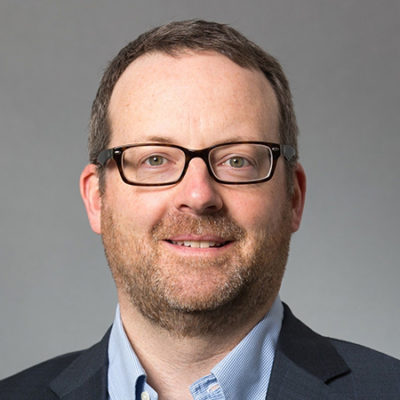
Geoffrey Coates
Thrust Leader: Membranes
Prof. Coates is the Tisch University Professor in the Department of Chemistry and Chemical Biology at Cornell University. His teaching and research interests involve science at the interface of organic, inorganic, and materials chemistry. The broader impacts of his research include benign polymers and chemical synthesis, the utilization of renewable resources, and materials safe and economical energy storage and conversion.
Prof. Coates is the Tisch University Professor in the Department of Chemistry and Chemical Biology at Cornell University. His teaching and research interests involve science at the interface of organic, inorganic, and materials chemistry. The broader impacts of his research include benign polymers and chemical synthesis, the utilization of renewable resources, and materials safe and economical energy storage and conversion.

Francis DiSalvo
Former Researcher: Electrocatalysis and Supports Thrusts
The DiSalvo Group’s research focused on the synthesis, characterization and potential applications of new solid state materials. His research interests included: 1) the development of general methods for the synthesis of compositionally and structurally complex intermetallic nano-particles for possible application as fuel cell catalysts, 2) the discovery and application of mesostructured conducting oxide and nitride materials as catalyst supports for electrochemical systems, including fuel cells, 3) higher energy and power density materials for battery technologies.
The DiSalvo Group’s research focused on the synthesis, characterization and potential applications of new solid state materials. His research interests included: 1) the development of general methods for the synthesis of compositionally and structurally complex intermetallic nano-particles for possible application as fuel cell catalysts, 2) the discovery and application of mesostructured conducting oxide and nitride materials as catalyst supports for electrochemical systems, including fuel cells, 3) higher energy and power density materials for battery technologies.
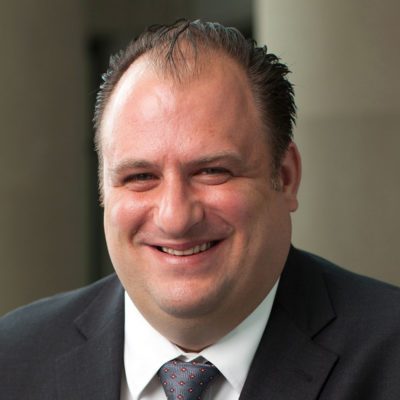
Robert DiStasio
Researcher: Theory
By utilizing the computational techniques of quantum and statistical mechanics, the DiStasio research group seeks to address challenging problems in theoretical chemistry and further our understanding of fundamental systems and processes of importance throughout all disciplines of chemistry, ranging from organic/inorganic chemistry (i.e., catalyst design, solvation/solvent effects) to biochemistry (i.e., stability, structure, and function of proteins, enzymes, and DNA/RNA, drug discovery) and materials science (i.e., molecular crystal polymorphism, forward and inverse design of novel materials).
By utilizing the computational techniques of quantum and statistical mechanics, the DiStasio research group seeks to address challenging problems in theoretical chemistry and further our understanding of fundamental systems and processes of importance throughout all disciplines of chemistry, ranging from organic/inorganic chemistry (i.e., catalyst design, solvation/solvent effects) to biochemistry (i.e., stability, structure, and function of proteins, enzymes, and DNA/RNA, drug discovery) and materials science (i.e., molecular crystal polymorphism, forward and inverse design of novel materials).
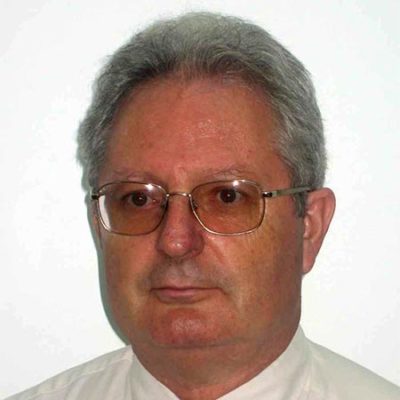
Juan Feliu
Advisory Board Member
Addressed problems of research trying to establish relationships between the structure and the surface composition and electrochemical reactivity, in the fields of electrochemistry of surfaces and Electrocatalysis fundamentals. To this end, are prepared in single crystals of Platinum, gold, rhodium and Palladium with different orientation surface, including base levels, terraced surfaces and surfaces containing corners in a controlled manner. The modification of the surface composition is adsorbing submonocapas of atoms, trying to preserve the structure of the substrate. The surface properties are characterized using various atomic or molecular probes including charged species adsorbed on the surface. The electrocatalycs properties are focused mainly in the oxidation of organic and nitrogenous molecules. In this activity, he is the co-author of more than 180 publications and has given over 60 conferences at different congresses and meetings.
Addressed problems of research trying to establish relationships between the structure and the surface composition and electrochemical reactivity, in the fields of electrochemistry of surfaces and Electrocatalysis fundamentals. To this end, are prepared in single crystals of Platinum, gold, rhodium and Palladium with different orientation surface, including base levels, terraced surfaces and surfaces containing corners in a controlled manner. The modification of the surface composition is adsorbing submonocapas of atoms, trying to preserve the structure of the substrate. The surface properties are characterized using various atomic or molecular probes including charged species adsorbed on the surface. The electrocatalycs properties are focused mainly in the oxidation of organic and nitrogenous molecules. In this activity, he is the co-author of more than 180 publications and has given over 60 conferences at different congresses and meetings.
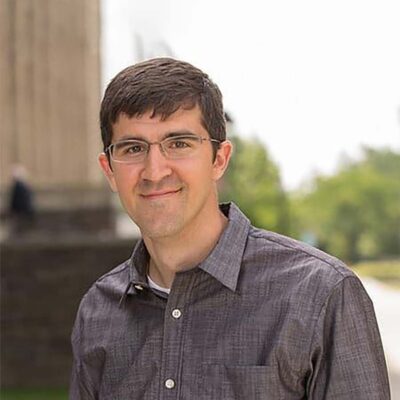
Brett Fors
Researcher: Membranes
Research in the Fors group will focus on the development of new synthetic methods and catalyst systems to control polymer architecture, composition, and function. Under this general theme, three different areas of research will be pursued. First, new systems will be developed that will enable precise regulation over catalyst reactivity in situ with light. This general platform will allow control of a diverse array of polymerization processes (i.e., radical, cationic, ring-opening, insertion, etc.) with an external stimulus, which will facilitate a broad range of applications in polymer and materials science. Second, new strategies for the synthesis of conjugated polymers from the parent C–H based monomers will be investigated. These systems will provide more environmentally friendly processes, greatly simplify monomer synthesis, and provide access to novel structures. Lastly, new catalyst systems will be explored for photomediated radical polymerizations.
Research in the Fors group will focus on the development of new synthetic methods and catalyst systems to control polymer architecture, composition, and function. Under this general theme, three different areas of research will be pursued. First, new systems will be developed that will enable precise regulation over catalyst reactivity in situ with light. This general platform will allow control of a diverse array of polymerization processes (i.e., radical, cationic, ring-opening, insertion, etc.) with an external stimulus, which will facilitate a broad range of applications in polymer and materials science. Second, new strategies for the synthesis of conjugated polymers from the parent C–H based monomers will be investigated. These systems will provide more environmentally friendly processes, greatly simplify monomer synthesis, and provide access to novel structures. Lastly, new catalyst systems will be explored for photomediated radical polymerizations.

Giulia Galli
Advisory Board Member
Giulia Galli is the Liew Family professor of Electronic Structure and Simulations in the Institute for Molecular Engineering and Professor of Chemistry at the University of Chicago. She also holds a Senior Scientist position at Argonne National Laboratory (ANL). Prior to joining UChicago and ANL, she was Professor of Chemistry and Physics at UC Davis (2005-2013) and the head of the Quantum Simulations group at the Lawrence Livermore National Laboratory (1998-2005). She holds a Ph.D. in Physics from the International School of Advanced Studies (SISSA) in Trieste, Italy. She is a Fellow of the American Physical Society and American Association for the Advancement of Science. She is a recipient of the Lawrence Livermore National Laboratory Science and Technology Award, the Department of Energy Award of Excellence, the 2018 Materials Research Society Theory Award, the 2019 David Adler Lectureship in Materials Physics and the 2019 Nelson W. Taylor Award. She served as chair of the Extreme Physics and Chemistry of Carbon Directorate of the Deep Carbon Observatory (DCO) in 2010-2013 and she is currently the director of MICCoM (Midwest Integrated Center for Computational Materials), established by DOE in 2015. Her research activity is focused on the development and use of theoretical and computational methods to understand and predict the properties and behavior of materials (solids, liquids and nanostructures) from first principles.
Giulia Galli is the Liew Family professor of Electronic Structure and Simulations in the Institute for Molecular Engineering and Professor of Chemistry at the University of Chicago. She also holds a Senior Scientist position at Argonne National Laboratory (ANL). Prior to joining UChicago and ANL, she was Professor of Chemistry and Physics at UC Davis (2005-2013) and the head of the Quantum Simulations group at the Lawrence Livermore National Laboratory (1998-2005). She holds a Ph.D. in Physics from the International School of Advanced Studies (SISSA) in Trieste, Italy. She is a Fellow of the American Physical Society and American Association for the Advancement of Science. She is a recipient of the Lawrence Livermore National Laboratory Science and Technology Award, the Department of Energy Award of Excellence, the 2018 Materials Research Society Theory Award, the 2019 David Adler Lectureship in Materials Physics and the 2019 Nelson W. Taylor Award. She served as chair of the Extreme Physics and Chemistry of Carbon Directorate of the Deep Carbon Observatory (DCO) in 2010-2013 and she is currently the director of MICCoM (Midwest Integrated Center for Computational Materials), established by DOE in 2015. Her research activity is focused on the development and use of theoretical and computational methods to understand and predict the properties and behavior of materials (solids, liquids and nanostructures) from first principles.
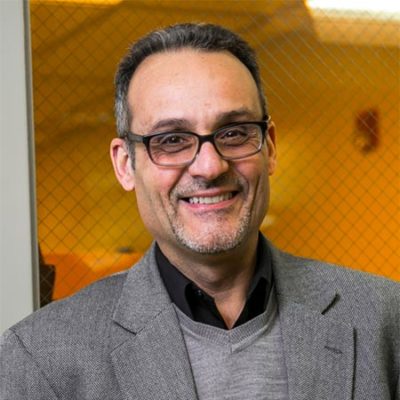
Emmanuel Giannelis
Researcher: Supports
Giannelis is the Walter R. Read Professor of Engineering and the Associate Dean for Research and Graduate Education in the College of Engineering. His research interests include Nanomaterials for Energy, Biomedical, and Environmental Applications. His group is internationally recognized as one of the leading groups in nanohybrids and nanocomposites. He is a Fellow of the American Chemical Society and of the Polymer Materials Science and Engineering Division of the American Chemical Society. He has won the 2014 Cooperative Research Award from the American Chemical Society, and he is a member of the European Academy of Sciences.
Giannelis is the Walter R. Read Professor of Engineering and the Associate Dean for Research and Graduate Education in the College of Engineering. His research interests include Nanomaterials for Energy, Biomedical, and Environmental Applications. His group is internationally recognized as one of the leading groups in nanohybrids and nanocomposites. He is a Fellow of the American Chemical Society and of the Polymer Materials Science and Engineering Division of the American Chemical Society. He has won the 2014 Cooperative Research Award from the American Chemical Society, and he is a member of the European Academy of Sciences.

Craig Gittleman
Advisory Board Member
- 22 years experience in industrial R&D with 18 years experience in electrochemical energy systems and materials including fuel cells and Li-ion batteries
- 12 years experience in R&D management with excellent track records for innovation, government, industry and academic colloabariations, technology transfer and people development
- Ambassador for U.S. Automotive OEMs for Fuel Cell R&D needs
- Initiation and oversight of numerous multimillion dollar joint development programs
- Facilitation and writing of successful proposals for government funding
- Coauthored 28 U.S. patents and pending patent applications, 26 peer-reviewed papers and three book chapters
- Regular invited lecturer at technical conferences, university and national lab seminars and U.S. Department of Energy workshops
- 22 years experience in industrial R&D with 18 years experience in electrochemical energy systems and materials including fuel cells and Li-ion batteries
- 12 years experience in R&D management with excellent track records for innovation, government, industry and academic colloabariations, technology transfer and people development
- Ambassador for U.S. Automotive OEMs for Fuel Cell R&D needs
- Initiation and oversight of numerous multimillion dollar joint development programs
- Facilitation and writing of successful proposals for government funding
- Coauthored 28 U.S. patents and pending patent applications, 26 peer-reviewed papers and three book chapters
- Regular invited lecturer at technical conferences, university and national lab seminars and U.S. Department of Energy workshops
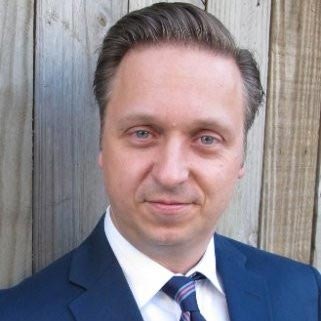
Tobias Glossmann
Advisory Board Member
Tobias Glossmann is Principal Systems Engineer and Project Leader for Advanced Battery Technology in the E-Mobility Group at Mercedes-Benz Research & Development North America (MBRDNA). His responsibilities include monitoring of technology trends related to battery materials and systems and also management of joint development and research projects between MBRDNA or its affiliates with North American companies, universities, and National Labs. He is the Principal Investigator for a project in the Department of Energy’s Battery500 Seedlings Program. Tobias has established business relationships to companies with emphasis on solutions that promise high energy density battery technology. During his career he made major contributions to numerous battery related solutions in the electronic, thermal, and controls fields that can be found in Mercedes-Benz vehicles, some have been patented.
Tobias Glossmann is Principal Systems Engineer and Project Leader for Advanced Battery Technology in the E-Mobility Group at Mercedes-Benz Research & Development North America (MBRDNA). His responsibilities include monitoring of technology trends related to battery materials and systems and also management of joint development and research projects between MBRDNA or its affiliates with North American companies, universities, and National Labs. He is the Principal Investigator for a project in the Department of Energy’s Battery500 Seedlings Program. Tobias has established business relationships to companies with emphasis on solutions that promise high energy density battery technology. During his career he made major contributions to numerous battery related solutions in the electronic, thermal, and controls fields that can be found in Mercedes-Benz vehicles, some have been patented.

Sharon Hammes-Schiffer
Researcher: Theory
Research in the Hammes-Schiffer group centers on the development and application of theoretical and computational methods for describing chemical reactions in condensed phases and at interfaces. Our overall objective is to elucidate the fundamental physical principles underlying charge transfer reactions, dynamics, and quantum mechanical effects in chemical, biological, and interfacial processes. Our research encompasses the development of analytical theories and computational methods, as well as applications to a wide range of experimentally relevant systems. The group is divided into three general areas: proton-coupled electron transfer reactions, enzymatic processes, and non-Born-Oppenheimer electronic structure methods.
Research in the Hammes-Schiffer group centers on the development and application of theoretical and computational methods for describing chemical reactions in condensed phases and at interfaces. Our overall objective is to elucidate the fundamental physical principles underlying charge transfer reactions, dynamics, and quantum mechanical effects in chemical, biological, and interfacial processes. Our research encompasses the development of analytical theories and computational methods, as well as applications to a wide range of experimentally relevant systems. The group is divided into three general areas: proton-coupled electron transfer reactions, enzymatic processes, and non-Born-Oppenheimer electronic structure methods.

Marc Koper
Advisory Board Member
Marc Koper (1967) studied chemistry at Utrecht University, and obtained his PhD (cum laude) with Prof. J.H. Sluyters from Utrecht University in 1994 on “Far-from-equilibrium phenomena in electrochemical systems: instabilities, oscillations and chaos”. From 1995 to 1997 he was a postdoctoral Marie Curie Fellow in the group of Prof. W. Schmickler at the University of Ulm (Germany). In 1997, he returned to the Netherlands to join the group of Prof. R.A. van Santen at Eindhoven University of Technology, where he initially was a Fellow of the Royal Netherlands Academy of Arts and Sciences and later associate professor. His interests are in electrochemistry, electrocatalysis, (electrochemical) surface science, and theoretical and computational (electro-)chemistry.
Marc Koper (1967) studied chemistry at Utrecht University, and obtained his PhD (cum laude) with Prof. J.H. Sluyters from Utrecht University in 1994 on “Far-from-equilibrium phenomena in electrochemical systems: instabilities, oscillations and chaos”. From 1995 to 1997 he was a postdoctoral Marie Curie Fellow in the group of Prof. W. Schmickler at the University of Ulm (Germany). In 1997, he returned to the Netherlands to join the group of Prof. R.A. van Santen at Eindhoven University of Technology, where he initially was a Fellow of the Royal Netherlands Academy of Arts and Sciences and later associate professor. His interests are in electrochemistry, electrocatalysis, (electrochemical) surface science, and theoretical and computational (electro-)chemistry.
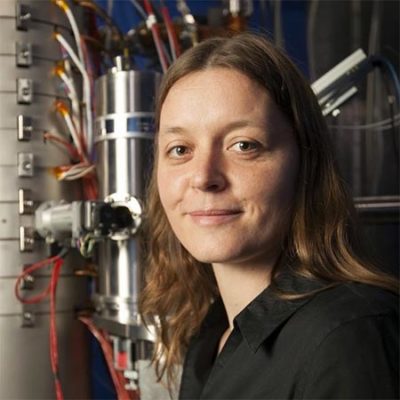
Lena Kourkoutis
Former Thrust Co-Leader: Methods / Researcher: Membranes
Kourkoutis received a Diploma in Physics from the University of Rostock, Germany in 2003, and then moved to Ithaca where she was awarded a PhD in 2009. As a Humboldt Research Fellow Kourkoutis spent 2011-2012 exploring cryo-electron microscopy in the Molecular Structural Biology Group at the Max Planck Institute of Biochemistry in Martinsried, Germany. She returned to Cornell as a Postdoctoral Associate in 2012 and joined the Applied and Engineering Faculty in 2013. She was recipient of a 2014 Packard Fellowship, a 2016 Presidential Early Career Award for Scientists and Engineers, a 2017 NSF CAREER award, and the 2018 Burton Metal by the Microscopy Society of America. She was also a Kavli Fellow of the National Academy of Sciences.
Kourkoutis received a Diploma in Physics from the University of Rostock, Germany in 2003, and then moved to Ithaca where she was awarded a PhD in 2009. As a Humboldt Research Fellow Kourkoutis spent 2011-2012 exploring cryo-electron microscopy in the Molecular Structural Biology Group at the Max Planck Institute of Biochemistry in Martinsried, Germany. She returned to Cornell as a Postdoctoral Associate in 2012 and joined the Applied and Engineering Faculty in 2013. She was recipient of a 2014 Packard Fellowship, a 2016 Presidential Early Career Award for Scientists and Engineers, a 2017 NSF CAREER award, and the 2018 Burton Metal by the Microscopy Society of America. She was also a Kavli Fellow of the National Academy of Sciences.
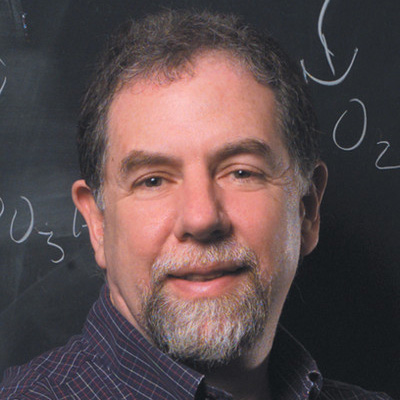
Thomas E. Mallouk
Thrust Leader: Supports
The Mallouk Group is interested in several problems in materials chemistry, including photoelectrochemistry, electrochemical energy conversion, low-dimensional physical phenomena, and motion on the nanoscale. Our approach involves the synthesis of materials that contain molecular and/or solid state components, and the study of their structure, assembly, and properties by a variety of physical techniques.
The Mallouk Group is interested in several problems in materials chemistry, including photoelectrochemistry, electrochemical energy conversion, low-dimensional physical phenomena, and motion on the nanoscale. Our approach involves the synthesis of materials that contain molecular and/or solid state components, and the study of their structure, assembly, and properties by a variety of physical techniques.
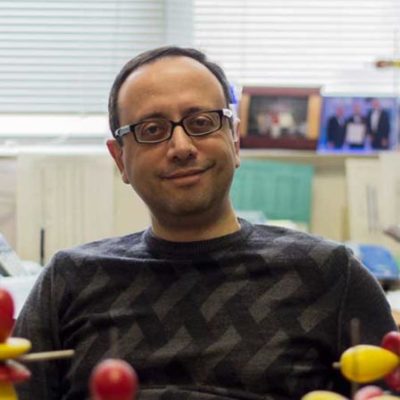
Manos Mavrikakis
Researcher: Theory
New materials with properties tailored to specific applications often represent the heart of novel chemical processes and important technological advances. The fundamental understanding of the correlation between materials structure and properties is the key to designing new materials with the desired properties. The primary focus of our research is on the atomic-scale materials design, based on first-principles electronic structure calculations. We are applying state-of-the-art theoretical methods to study a range of important surface phenomena including adsorption, diffusion and chemical reactions on a variety of catalytic and semiconductor surfaces.
New materials with properties tailored to specific applications often represent the heart of novel chemical processes and important technological advances. The fundamental understanding of the correlation between materials structure and properties is the key to designing new materials with the desired properties. The primary focus of our research is on the atomic-scale materials design, based on first-principles electronic structure calculations. We are applying state-of-the-art theoretical methods to study a range of important surface phenomena including adsorption, diffusion and chemical reactions on a variety of catalytic and semiconductor surfaces.
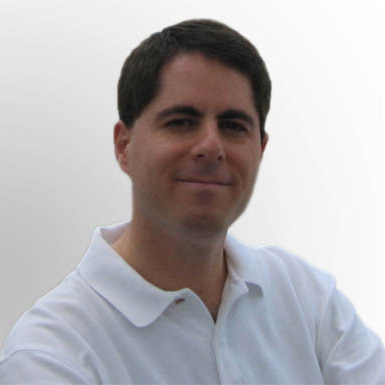
David A. Muller
Thrust Co-Leader: Electrocatalysis / Researcher: Methods
David Muller is the Samuel B. Eckert Professor of Engineering in the School of Applied and Engineering Physics at Cornell University, and the co-director of the Kavli Institute at Cornell for Nanoscale Science. His current research interests include the atomic-scale characterization and control of matter for applications in energy storage and conversion, exploring new phases of two-dimensional materials that cannot exist in the bulk, and developing a new generation of probability-current detectors and algorithms for measuring physical properties in an electron microscope.
David is a graduate of the University of Sydney and received a Ph.D. from Cornell University in the field of Physics. As a scientist at Bell Labs, he applied his research on imaging single atoms and atomic-scale spectroscopy to determine the physical limits on how small a transistor can be made. His work more generally has focused on the development of scanning transmission electron microscopy and spectroscopy as quantitative tools for atomic-resolution materials analysis, and its application to unraveling connections between electronic-structure changes on the atomic scale and the macroscopic behavior of materials. This includes systems as diverse as fuel cells, batteries, turbine blades, and two-dimensional superconductors.
David is a fellow of both the American Physical Society and the Microscopy Society of America, and recipient of the MSA Burton Medal and MAS Duncumb Award.
David Muller is the Samuel B. Eckert Professor of Engineering in the School of Applied and Engineering Physics at Cornell University, and the co-director of the Kavli Institute at Cornell for Nanoscale Science. His current research interests include the atomic-scale characterization and control of matter for applications in energy storage and conversion, exploring new phases of two-dimensional materials that cannot exist in the bulk, and developing a new generation of probability-current detectors and algorithms for measuring physical properties in an electron microscope.
David is a graduate of the University of Sydney and received a Ph.D. from Cornell University in the field of Physics. As a scientist at Bell Labs, he applied his research on imaging single atoms and atomic-scale spectroscopy to determine the physical limits on how small a transistor can be made. His work more generally has focused on the development of scanning transmission electron microscopy and spectroscopy as quantitative tools for atomic-resolution materials analysis, and its application to unraveling connections between electronic-structure changes on the atomic scale and the macroscopic behavior of materials. This includes systems as diverse as fuel cells, batteries, turbine blades, and two-dimensional superconductors.
David is a fellow of both the American Physical Society and the Microscopy Society of America, and recipient of the MSA Burton Medal and MAS Duncumb Award.

Paul Mutolo
Executive Director
Paul F. Mutolo is the Executive Director of CABES, as well as Director of External Partnerships for the Energy Materials Center at Cornell. A fuel cell chemist, Paul has been working in the energy sector for nearly 20 years.
Paul F. Mutolo is the Executive Director of CABES, as well as Director of External Partnerships for the Energy Materials Center at Cornell. A fuel cell chemist, Paul has been working in the energy sector for nearly 20 years.
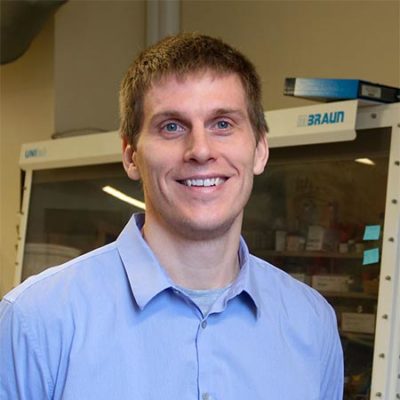
Kevin Noonan
Researcher: Membranes
Research in our group is focused on the synthesis of new compounds possessing main group elements to impact polymer chemistry and catalysis. The advent of synthetic polymer chemistry has had an enormous impact on our modern world. Though most commercial polymeric materials are made from organic synthons, the incorporation of main group elements or transition metals into polymer backbones can afford materials with unique properties. The synthetic preparation of these materials remains challenging and continued development will result in unique macromolecular architectures. New design strategies to incorporate inorganic elements such as boron and phosphorus into electronic materials will be explored.
Research in our group is focused on the synthesis of new compounds possessing main group elements to impact polymer chemistry and catalysis. The advent of synthetic polymer chemistry has had an enormous impact on our modern world. Though most commercial polymeric materials are made from organic synthons, the incorporation of main group elements or transition metals into polymer backbones can afford materials with unique properties. The synthetic preparation of these materials remains challenging and continued development will result in unique macromolecular architectures. New design strategies to incorporate inorganic elements such as boron and phosphorus into electronic materials will be explored.
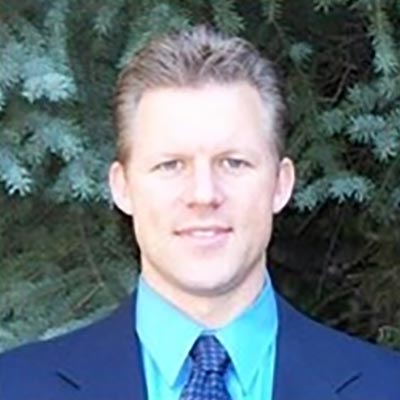
Bryan Pivovar
Researcher: Membranes
Bryan Pivovar is a senior research fellow and fuel cell group manager in the Chemistry and Nanosciences Center at NREL. He oversees NREL’s electrolysis and fuel cell research and development activities and supports strategic planning in the areas of electrons to molecules/H2@Scale and polymers/membranes.
Pivovar has over 25 years of experience in the area of polymer electrolytes and fuel cells. He is a pioneer in several areas of fuel cell and electrolyzer development including membranes, electrocatalysts, and membrane electrode assemblies and interfaces. His current efforts have a strong focus on novel alkaline membranes for fuel cell and electrolysis devices.
Prior to joining NREL, he led the fuel cell team at Los Alamos National Laboratory. He has taken on multiple leadership roles in the scientific community organizing workshops for the U.S. Department of Energy in the areas of sub-freezing effects, alkaline membranes, and extended surface electrocatalysis. He was the 2007 co-chair of the Gordon Research Conference – Fuel Cells, co-organizer of the 2019 Renewable H2 Gigaton Workshop, and will be lead organizer for the 2021 International Conference on Electrolysis. He received the 2012 Tobias Young Investigator Award from the Electrochemical Society and has co-authored over 150 papers in the general area of fuel cells and electrolysis.
Bryan Pivovar is a senior research fellow and fuel cell group manager in the Chemistry and Nanosciences Center at NREL. He oversees NREL’s electrolysis and fuel cell research and development activities and supports strategic planning in the areas of electrons to molecules/H2@Scale and polymers/membranes.
Pivovar has over 25 years of experience in the area of polymer electrolytes and fuel cells. He is a pioneer in several areas of fuel cell and electrolyzer development including membranes, electrocatalysts, and membrane electrode assemblies and interfaces. His current efforts have a strong focus on novel alkaline membranes for fuel cell and electrolysis devices.
Prior to joining NREL, he led the fuel cell team at Los Alamos National Laboratory. He has taken on multiple leadership roles in the scientific community organizing workshops for the U.S. Department of Energy in the areas of sub-freezing effects, alkaline membranes, and extended surface electrocatalysis. He was the 2007 co-chair of the Gordon Research Conference – Fuel Cells, co-organizer of the 2019 Renewable H2 Gigaton Workshop, and will be lead organizer for the 2021 International Conference on Electrolysis. He received the 2012 Tobias Young Investigator Award from the Electrochemical Society and has co-authored over 150 papers in the general area of fuel cells and electrolysis.
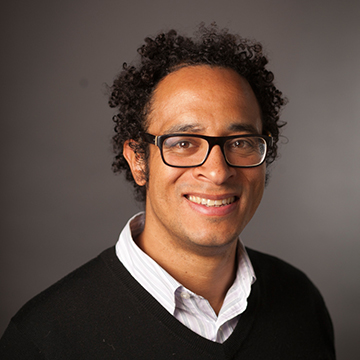
Richard Robinson
Researcher: Electrocatalysis
The Robinson’s group research focuses on the synthesis, characterization, and potential applications of new low-dimensional nanomaterials, with a specialty in colloidal nanoparticles. The main thrusts of the Robinson group are: (I) Synthesis and chemical transformations in nanocrystals, (II) Nanocrystals in energy applications, and (III) Synchrotron x-ray characterization of nanomaterials. Richard Robinson received his PhD in Applied Physics from Columbia University and was a postdoctoral fellow in Chemistry at University of California, Berkeley/LBNL.
The Robinson’s group research focuses on the synthesis, characterization, and potential applications of new low-dimensional nanomaterials, with a specialty in colloidal nanoparticles. The main thrusts of the Robinson group are: (I) Synthesis and chemical transformations in nanocrystals, (II) Nanocrystals in energy applications, and (III) Synchrotron x-ray characterization of nanomaterials. Richard Robinson received his PhD in Applied Physics from Columbia University and was a postdoctoral fellow in Chemistry at University of California, Berkeley/LBNL.

Raymond Schaak
Researcher: Electrocatalysis
The Schaak group’s primary research interests are in the general area of synthetic inorganic nanochemistry. We develop new synthetic tools and expand existing ones, using both as a platform for materials discovery and target-oriented synthesis. We also emphasize mechanistic understanding of how nanochemical and solid-state reactions proceed, including elucidating reaction pathways that lead to structural, compositional, and morphological control. We identify strategic materials systems that underpin practical and emerging applications, but for which a fundamentally interesting synthetic bottleneck precludes their formation. We then develop new synthetic tools that overcome these challenges, both to generate and study our specific target materials and also to provide conceptually new synthetic approaches that are broadly applicable. Our targets, materials systems, and applications are diverse, spanning metals, metal alloys, metal oxides, metal chalcogenides, metal phosphides, metal carbides, and metal borides for use primarily in catalysis related to energy conversion and storage. Current areas of emphasis include compositionally complex (high entropy) materials, heterostructured (multi-component) nanoparticles, metastable compounds, layered compounds, two-dimensional materials, and materials libraries.
The Schaak group’s primary research interests are in the general area of synthetic inorganic nanochemistry. We develop new synthetic tools and expand existing ones, using both as a platform for materials discovery and target-oriented synthesis. We also emphasize mechanistic understanding of how nanochemical and solid-state reactions proceed, including elucidating reaction pathways that lead to structural, compositional, and morphological control. We identify strategic materials systems that underpin practical and emerging applications, but for which a fundamentally interesting synthetic bottleneck precludes their formation. We then develop new synthetic tools that overcome these challenges, both to generate and study our specific target materials and also to provide conceptually new synthetic approaches that are broadly applicable. Our targets, materials systems, and applications are diverse, spanning metals, metal alloys, metal oxides, metal chalcogenides, metal phosphides, metal carbides, and metal borides for use primarily in catalysis related to energy conversion and storage. Current areas of emphasis include compositionally complex (high entropy) materials, heterostructured (multi-component) nanoparticles, metastable compounds, layered compounds, two-dimensional materials, and materials libraries.
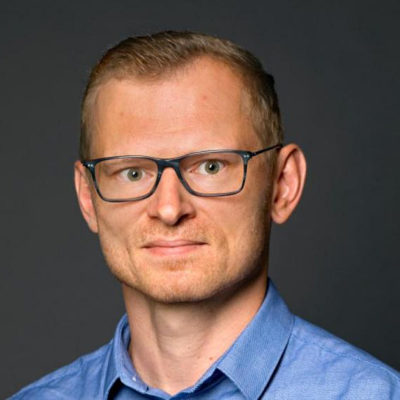
Andrej Singer
Thrust Leader: Methods
Andrej Singer received his Ph.D. degree (2012) in Physics from the University of Hamburg, Germany in the lab of Prof. Edgar Weckert and Prof. Ivan Vartanyants, following a Physics diploma from the University of Muenster, Germany. He studied the properties of new x-ray sources, particularly their ability to generate interference patterns, similar to lasers in optics. He then worked as a Postdoc in the lab of Prof. Oleg Shpyrko at the University of California San Diego and applied coherent x-ray scattering techniques to study a wider range of materials, spanning from fundamental correlated electron materials and applied “real” materials in operando devices to photonic crystals, in particular those present in nature.
Andrej Singer received his Ph.D. degree (2012) in Physics from the University of Hamburg, Germany in the lab of Prof. Edgar Weckert and Prof. Ivan Vartanyants, following a Physics diploma from the University of Muenster, Germany. He studied the properties of new x-ray sources, particularly their ability to generate interference patterns, similar to lasers in optics. He then worked as a Postdoc in the lab of Prof. Oleg Shpyrko at the University of California San Diego and applied coherent x-ray scattering techniques to study a wider range of materials, spanning from fundamental correlated electron materials and applied “real” materials in operando devices to photonic crystals, in particular those present in nature.
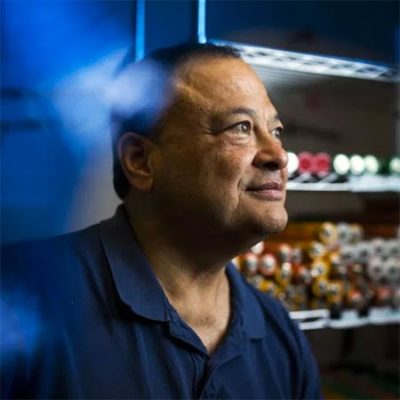
Eugene Smotkin
Advisory Board Member
Eugene Smotkin obtained his Ph.D. from the University of Texas at Austin in 1989. Dr. Smotkin co-founded NuVant Systems in 1999 and is Chairman of the Board of Directors. He is a Professor in the Department of Chemistry and Chemical Biology at Northeastern University in Boston. He has 20 years experience in fuel cell R&D; awarded over $14 million in government and industry grants, has over 100 peer-reviewed articles and 8 patents. He was admitted as a Fellow of the Society of Innovators of Northwest Indiana in 2013. He is a member of the American Chemical Society and the Electrochemical Society and is the Faculty adviser to the Boston Electrochemical Society Student Chapter.
Eugene Smotkin obtained his Ph.D. from the University of Texas at Austin in 1989. Dr. Smotkin co-founded NuVant Systems in 1999 and is Chairman of the Board of Directors. He is a Professor in the Department of Chemistry and Chemical Biology at Northeastern University in Boston. He has 20 years experience in fuel cell R&D; awarded over $14 million in government and industry grants, has over 100 peer-reviewed articles and 8 patents. He was admitted as a Fellow of the Society of Innovators of Northwest Indiana in 2013. He is a member of the American Chemical Society and the Electrochemical Society and is the Faculty adviser to the Boston Electrochemical Society Student Chapter.
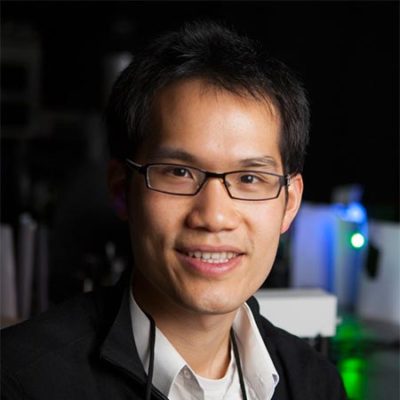
Jin Suntivich
Researcher: Electrocatalysis, Methods
Jin Suntivich is an assistant professor in the Department of Materials Science and Engineering at Cornell University. Jin received his B.A. in Integrated Science and B.S. in Materials Science and Engineering from Northwestern University. Afterward, Jin went to obtain his Sc.D. in Materials Science and Engineering from MIT, where his research focused on finding a structure-property relation that controls the electrochemical activity of transition metal oxides and nanoparticles for fuel cells, electrolyzers, and metal-air batteries. Jin conducted his postdoctoral fellowship at the Harvard University Center for the Environment. There, he worked on understanding the light-matter interaction in titanium oxides and the role of non-equilibrium structure on the surface chemistry and the carrier lifetimes. His interest is in developing rational strategies for designing new materials for energy and environmental applications.
Jin Suntivich is an assistant professor in the Department of Materials Science and Engineering at Cornell University. Jin received his B.A. in Integrated Science and B.S. in Materials Science and Engineering from Northwestern University. Afterward, Jin went to obtain his Sc.D. in Materials Science and Engineering from MIT, where his research focused on finding a structure-property relation that controls the electrochemical activity of transition metal oxides and nanoparticles for fuel cells, electrolyzers, and metal-air batteries. Jin conducted his postdoctoral fellowship at the Harvard University Center for the Environment. There, he worked on understanding the light-matter interaction in titanium oxides and the role of non-equilibrium structure on the surface chemistry and the carrier lifetimes. His interest is in developing rational strategies for designing new materials for energy and environmental applications.
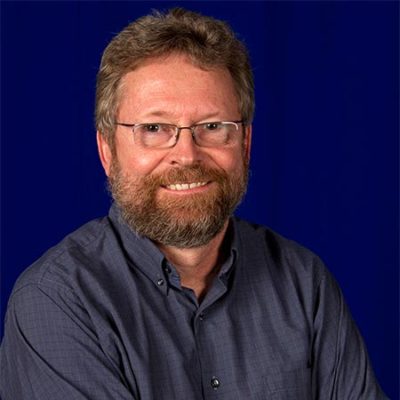
Piotr Zelenay
Thrust Co-Leader: Electrocatalysis
Piotr Zelenay is the Project and Team Leader and Lost Alamos National Laboratory. Zelenay has published more than 100 research articles in renowned scientific journals, including Nature and Science, co-authored nearly 300 presentations, of which approximately 100 have been invited/keynote/plenary lectures. To his credit, Dr. Zelenay has 16 patents and patent applications in the area of polymer electrolyte fuel cells.
His research is currently focused primarily on fundamental and applied aspects of polymer electrolyte fuel cell science and technology, electrocatalysis, and electrode kinetics. Since becoming Project Leader for LANL Fuel Cell Program in 2000, Zelenay has led numerous research projects and received more than 20 awards and recognitions.
Among others, in June 2010, he was awarded the DOE Hydrogen Program R&D Award in Recognition of Outstanding Contributions to Fuel Cell Technologies for research on non-precious metal electrocatalysts for oxygen reduction reaction and, presently, The Electrochemical Society Energy Technology Division Research Award. Dr. Zelenay is a member of The Electrochemical Society, International Society of Electrochemistry and Editorial Board of Electrocatalysis.
Piotr Zelenay is the Project and Team Leader and Lost Alamos National Laboratory. Zelenay has published more than 100 research articles in renowned scientific journals, including Nature and Science, co-authored nearly 300 presentations, of which approximately 100 have been invited/keynote/plenary lectures. To his credit, Dr. Zelenay has 16 patents and patent applications in the area of polymer electrolyte fuel cells.
His research is currently focused primarily on fundamental and applied aspects of polymer electrolyte fuel cell science and technology, electrocatalysis, and electrode kinetics. Since becoming Project Leader for LANL Fuel Cell Program in 2000, Zelenay has led numerous research projects and received more than 20 awards and recognitions.
Among others, in June 2010, he was awarded the DOE Hydrogen Program R&D Award in Recognition of Outstanding Contributions to Fuel Cell Technologies for research on non-precious metal electrocatalysts for oxygen reduction reaction and, presently, The Electrochemical Society Energy Technology Division Research Award. Dr. Zelenay is a member of The Electrochemical Society, International Society of Electrochemistry and Editorial Board of Electrocatalysis.

Lin Zhuang
Advisory Board Member
Lin Zhuang received his Ph.D. in electrochemistry in 1998 at Wuhan University, and has been a full professor in Wuhan University since 2003. He was a visiting scientist at Cornell University in 2004–2005, and an adjunct professor of Xiamen University. He is a recipient of National Science Foundation of China for Distinguished Young Scholars and Chang Jiang Professorship appointed by the Ministry of Education of China. He served as an associate editor of Acta Physico-Chimica Sinica, and is going to be an associate editor of ACS Sustainable Chemistry & Engineering. He has been an editorial board member of several journals including J. Phys. Chem., J. Electroanal. Chem. and Sci. China–Chem. He was a vice chair of the physical electrochemistry division of ISE (2011–2012) and the chair of China section of ECS (2010–2011), and is the president elect of the Chinese Society of Electrochemistry (CSE). His research has been focused on electrocatalysis and electrochemical energy technology.
Prof. Lin Zhuang is known as a pioneer scientist of alkaline polymer electrolyte fuel cells (APEFCs), a new fuel-cell technology without the need of precious catalysts. He reported the first prototype of APEFC completely free from noble metal catalysts (PNAS 2008), and has been leading the development of this field, including the recent milestone achievement of 2 W/cm2 in single-cell power density (Angew. Chem. 2019). In addition to fuel cells, he also works on other energy-related areas, such as water electrolysis and CO2 reduction.
Lin Zhuang received his Ph.D. in electrochemistry in 1998 at Wuhan University, and has been a full professor in Wuhan University since 2003. He was a visiting scientist at Cornell University in 2004–2005, and an adjunct professor of Xiamen University. He is a recipient of National Science Foundation of China for Distinguished Young Scholars and Chang Jiang Professorship appointed by the Ministry of Education of China. He served as an associate editor of Acta Physico-Chimica Sinica, and is going to be an associate editor of ACS Sustainable Chemistry & Engineering. He has been an editorial board member of several journals including J. Phys. Chem., J. Electroanal. Chem. and Sci. China–Chem. He was a vice chair of the physical electrochemistry division of ISE (2011–2012) and the chair of China section of ECS (2010–2011), and is the president elect of the Chinese Society of Electrochemistry (CSE). His research has been focused on electrocatalysis and electrochemical energy technology.
Prof. Lin Zhuang is known as a pioneer scientist of alkaline polymer electrolyte fuel cells (APEFCs), a new fuel-cell technology without the need of precious catalysts. He reported the first prototype of APEFC completely free from noble metal catalysts (PNAS 2008), and has been leading the development of this field, including the recent milestone achievement of 2 W/cm2 in single-cell power density (Angew. Chem. 2019). In addition to fuel cells, he also works on other energy-related areas, such as water electrolysis and CO2 reduction.

